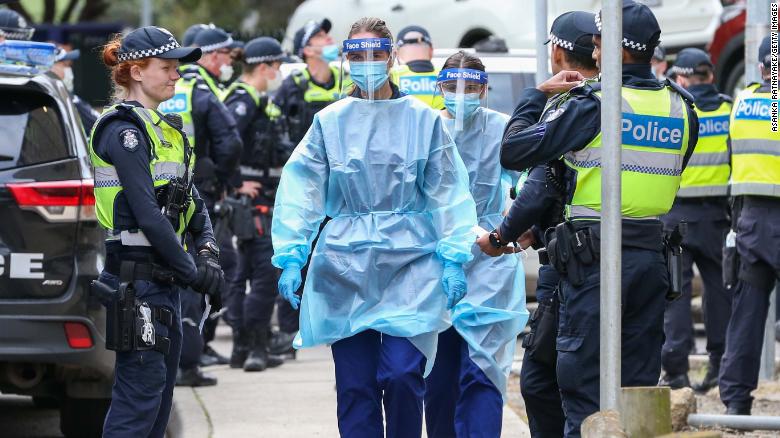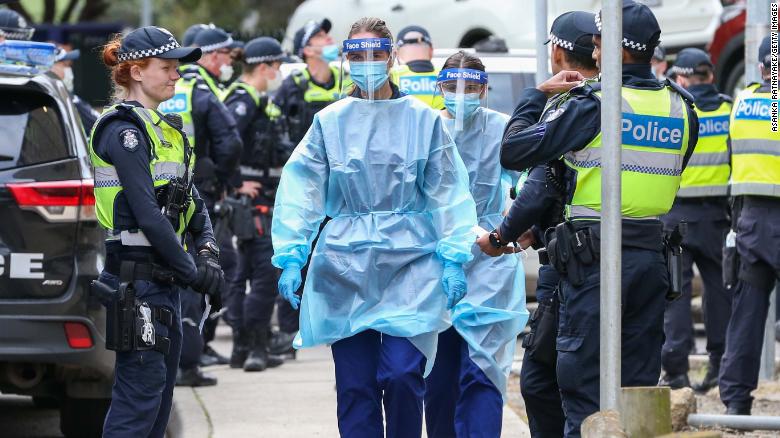A version of this story appeared in the July 6 edition of CNN's Coronavirus: Fact vs. Fiction newsletter. Sign up here to receive the need-to-know headlines every weekday.
(CNN)Coronavirus can float through the air. It's likely transmitting that way. That's why experts want you to wear face masks and stop going to crowded bars, churches and other indoor spaces.
A group of 239 international scientists wrote an open letter to the World Health Organization and other agencies to be more forthright in explaining the airborne nature of the virus. They say some public health officials seem reluctant to use the "loaded" word.
"The best vaccine against fear is knowledge and empowering people to take care of themselves," Donald Milton, a professor of environmental health at the University of Maryland and one of the main authors of the open letter published today, told CNN.
The virus is carried on droplets that come out of people's mouths and noses. Larger droplets fall onto surfaces and can be picked up, then carried to the eyes, nose or mouth. That's why regular hand washing and surface cleaning is crucial. Smaller droplets, however, can stay in the air for longer and be inhaled deeply into the lungs.
Studies have indicated that the virus can survive in the air for three hours and for up to three days on some surfaces. And scientists also know the virus-laden droplets are released not just by sneezes or coughs, but also by talking and possibly even just by breathing. Shouting, singing and panting during exercise are thought to release higher amounts of droplets.
"A lot of people crowded close together indoors where it is poorly ventilated -- that is what drives the pandemic," Milton said. "Why wearing a mask is important is because it blocks the aerosols at their source, when it is easy to block them."
YOU ASKED. WE ANSWERED
Q: Is it true young people with coronavirus are also having blood clots and strokes?
A: Data so far suggests most young people who test positive for Covid-19 don't require clinical attention. But there is growing evidence that the infection can cause the blood to clot in unusual ways, and strokes would be an expected consequence of that. It is not common for young people to have strokes, especially in the large vessels of the brain. And there have been some cases of young adults who have suffered strokes after getting coronavirus.
"The virus seems to be causing increased clotting in the large arteries, leading to severe stroke," Dr. Thomas Oxley, a neurosurgeon at Mount Sinai Health System in New York, said in April.
Send your questions here. Are you a health care worker fighting Covid-19? Message us on WhatsApp about the challenges you're facing: +1 347-322-0415.
WHAT'S IMPORTANT TODAY
These counties in Texas are running out of hospital beds
Local hospitals in Starr and Hidalgo counties in Texas reached their capacity ahead of the holiday weekend, prompting local officials to urge residents to shelter in place. Two months after the state started lifting coronavirus restrictions, local leaders including Governor Greg Abbott are starting to admit the aggressive reopening strategy has made the outbreak worse.
Texas was one of 32 states that recorded rises in new daily cases. But despite the crisis, President Donald Trump continues to downplay the risk. On Saturday, he made a dangerously inaccurate claim that 99% of coronavirus cases are "totally harmless." The US case fatality rate from coronavirus stood at 4.6% on Saturday when Trump made the claim, according to Johns Hopkins University data. The World Health Organization has said that 20% of all people who are diagnosed with coronavirus are sick enough to need oxygen or hospital care.
Africa's battle against Covid-19 will be won or lost here
Before the pandemic, when tourists flocked to Cape Town, they often ignored Khayelitsha. Crammed with more than half a million people, the township is now the center of attention.
High-density areas like Khayelitsha are being closely watched because doctors say that places like this are where the battle against Covid-19 on the African continent will be won or lost. And South Africa is, by far and away, the hardest-hit country on the continent. Its confirmed case count is approaching 200,000, and rising fast, David McKenzie and Brent Swails report.
Florida's health authorities often fail to do contact tracing
Florida surpassed 200,000 cases of Covid-19 yesterday. But despite claims that Florida traces every case of Covid-19, a CNN investigation found that health authorities in Florida, now the No. 1 hotspot for the virus in the US, often fail to do contact tracing, long considered a key tool in containing an outbreak.
Elizabeth Cohen and Dana Vigue spoke with 27 Floridians, or their family members, who'd tested positive for Covid-19. Of those, only five said they had received a call from health authorities asking for their contacts.
'Crystal clear' that drunk people can't socially distance
Pubs in England opened Saturday after nearly 15 weeks of coronavirus shutdowns. But it was a strange experience for those who ventured out. Customers were asked for contact details before they could enter in order to help with Covid-19 contact tracing should patrons subsequently test positive. In many establishments, plastic screens were set up, staff wore heavy protective equipment and glasses were swapped out for disposable cups.
A high-profile police officer John Apter had this to say after a late night shift: "Confirmed what we knew, alcohol and social distancing is not a good combination."
Nick Cordero dies after battle with Covid-19
The Broadway actor has passed after a 95-day battle with Covid-19, according to his wife, Amanda Kloots. He was 41. Kloots has been regularly updating her social media accounts with news of her husband's ups and downs as he battled the virus and complications, including an amputated leg. She said Cordero spent some time on a ventilator, suffered multiple Covid-19 complications including blood clots and damaged lungs and spent weeks unconscious, even as doctors brought him out of sedation.
Australia to seal off 6.6 million people in virus-hit state
Australia will shut off the state of Victoria from the rest of the nation at 11.59 p.m. on Tuesday, as authorities take drastic action to control a coronavirus outbreak in the city of Melbourne.
Victoria has struggled to contain a second wave of coronavirus cases, leading to fears that the infection rate could soon rise across the country.
The border between Victoria and New South Wales -- Australia's two most-populous states -- will be closed for the first time since the pandemic began and military personnel and police will line the border, allowing very few people to cross.
ON OUR RADAR
- Over 750 faculty at Georgia Tech signed a letter saying that the school's plan to reopen campus without face mask requirements is dangerous and not based on science.
- Four top Bolivian government officials, including the health minister, tested positive for Covid-19 within days of each other.
- Lockdown has been ordered for 200,000 in northeastern Spain due to Covid-19 outbreaks there.
- A growing outbreak in Arizona has forced neighboring Mexico to set up additional checkpoints across the border to prevent unauthorized travel and conduct health checks on people crossing from the US.
- Efforts to beat the coronavirus pandemic could cause more than 1 million extra deaths from other diseases, experts warn.
- India has overtaken Russia to become the world's third worst-impacted country. The nation of 1.3 billion people has reported more than 697,000 cases and almost 20,000 deaths as of Monday.
- Kimberly Guilfoyle -- Donald Trump Jr.'s girlfriend and top Trump campaign official -- has tested positive for coronavirus.
- Google Maps has launched new features to help users safely get around during the coronavirus pandemic.
- MIT has designed a robot that is capable of disinfecting the floor of a 4,000-square foot warehouse in only half an hour. It could one day be used to clean your local grocery store or school.
- A US Senator said he would introduce a bill to ban the sale of middle seats during the pandemic after he criticized American Airlines for selling them on flight he boarded.
- A teenager's coronavirus-themed prom dress made of duct tape is a work of art. It even comes with a coronavirus-shaped purse.
- More than 100 students at University of Washington fraternity houses in Seattle have tested positive for Covid-19.
TOP TIPS
After more than three months of shutdowns, mandatory quarantines, self-imposed exile from society and working from home, nature-lovers looking for a well-earned breath of fresh air could face a possible collision course between coronavirus and tick-borne illnesses this summer.
Here's to stay tick-safe in the outdoors:
- Wear light-colored clothing (it makes it easier to spot the ticks).
- Put on a hat and tuck your pants into socks.
- Treat clothing and shoes with the insecticide permethrin.
- Use DEET insect repellent on the skin.
- Do a body check when you return home.
- Remove any ticks as soon as possible. (Here is how.)
TODAY'S PODCAST
"Unfortunately, in the history of public health, there are so many of these events in which politicians ... did not recognize the problem and their populations suffered." -- Dr. Elmer Huerta, CNN Español's senior medical writer
Several of the countries with the highest coronavirus fatality rates are in Latin America. CNN Chief Medical Correspondent Dr. Sanjay Gupta talks to CNN Español's senior medical writer Dr. Elmer Huerta about the region that's become the epicenter of the coronavirus pandemic. Listen Now.


















